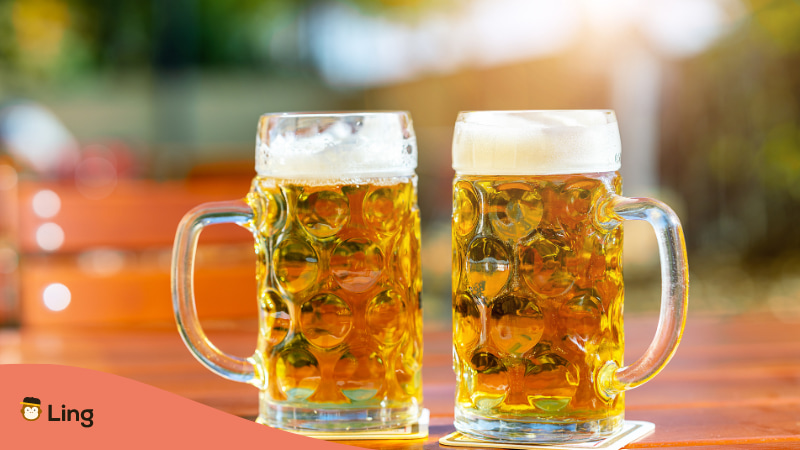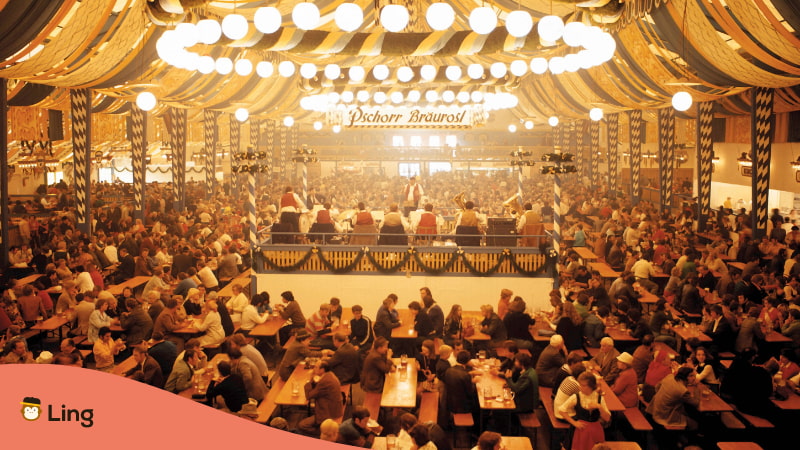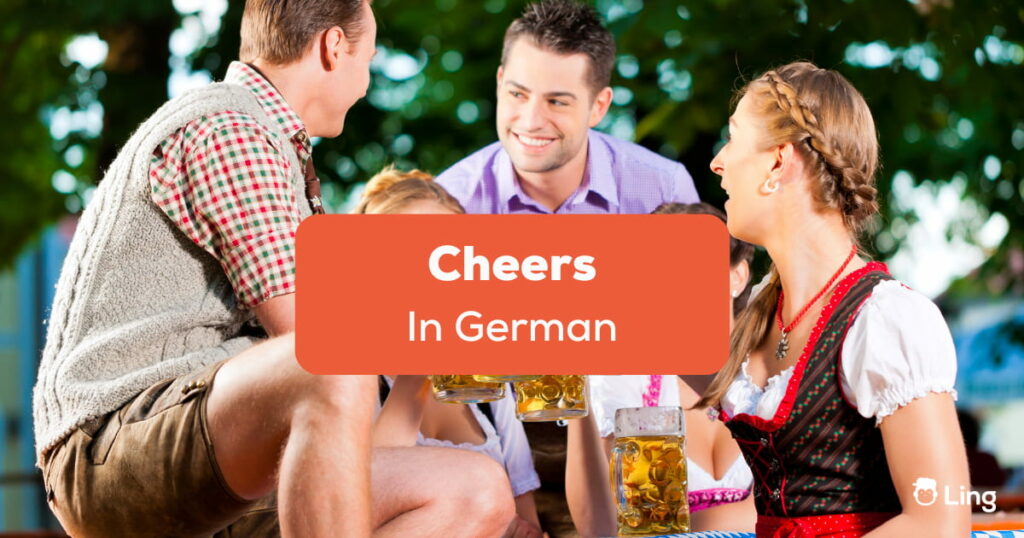Have you ever wondered how to say “Cheers” in German? You’ve probably heard that German beers are amongst the most popular beers in the world. The drinking culture in Germany is quite a unique one, too. It is not just about alcohol, but about the collective experience of being in a bar, at a festival, or in a restaurant. The culture encourages people to spend time with their family members and friends and enjoy life to the fullest!
The drinking culture in Germany can be compared to the one in America, as they both have similar habits and traditions. Today we’ll have a look a the most common traditions, tips & tricks, phrases, and words today and teach you how to get your first German beer with a bit of help from the Ling app!

What Do Germans Say When They Cheers?
There are several ways to say cheers in German. We’ll guide you through a couple of words and phrases on how to do exactly that and sound respectful when talking about alcohol since it’s a pretty big part of German culture. Here are three ways to say cheers in German:
1) Prost!
This is a toast that you can use for all occasions and situations. It’s not the formal toast because it doesn’t contain any “Cheers.” However, if you’re looking for some German cheers, this is a good one! “Prost” is basically saying that everyone is going to have fun and enjoy themselves. It’s also a drinking expression that means “To life! To health!”
2) Auf Deine Gesundheit!
“Gesundheit” is the German word for “Health,” and when being said in a toast, it can mean many things. When used, it is usually followed by “Cheers!” but this does not always have to be the case.
3) Zum Wohl!
Zum Wohl is a common toast in the country. There are many variations of the toast that can be said to express particular sentiments, like wishing you good health or happiness or thanking people for their help with something.
Cheers in German: A Brief History Of Drinking In German Culture
Here’s the thing, it is not only in Ireland where drinking is a well-loved activity. Germany is a country that loves its beer, wine, and liquor. German beer is a prime example of this. German culture has been regarded as one of the most alcohol-infused cultures in the world. It is also the world’s 8th largest economy, and the history of drinking in Germany is quite old. It can be traced back to the development of agriculture and brewing.
In Germany, beer is commonly known as “liquid bread.” Beer has been brewed in Germany for a thousand years, with the first brew of beer coming from the monks of a monastery south of Munich. The oldest of these is Weihenstephan (a part of a town called Freising), which dates back to the 11th century.
It is considered that people who drink more often are healthier and happier than those who do not. More than 60% of Germans drink alcohol on a daily basis, with beer being the most popular alcoholic beverage. In Germany, the legal drinking age is 16 years old, but it varies by state.
In the past, people considered drinking as a male-dominated activity. But now, women have become much more involved in the drinking culture. This is also because of public perception moving away from alcohol as an addictive substance.

Oktoberfest: One Of The Biggest Beer Festivals In The World
If you’re a hardcore beer lover, you’ve probably heard of Oktoberfest before. Oktoberfest is one of the most famous beer festivals in Germany. It is held every year in Munich and lasts 16 days.
Oktoberfest originated from an event called the Wiesn that took place on the first Sunday of October in 1810. It was a wedding celebration of Bavarian Crown Prince Ludwig I and Sophie Charlotte von Hesse-Kassel. The original event was held on public land outside Munich, which is why it has also been called the “Wiesn”, meaning something like a meadow in the Bavarian dialect. Later as it grew in popularity and in size, it moved to a location within city limits.
Oktoberfest remains one of the most important events in Bavaria, which has led to its spread throughout central Europe, becoming Europe’s largest folk festival and fair. You can practice saying cheers in German whenever you visit Germany for one of these events.
A Short Guide On How To Toast in German Etiquette
Cheers in German is not only having ein toast (a toast) but also a way to say goodbye. There are a few different traditions when it comes to toasting and saying farewells that you should know about. If you want to drink like a pro, keep these in mind for an authentic German experience.
- Staring is caring: it is extremely important to maintain eye contact while toasting with others – and not for just a moment or two. Try to maintain it for a while. Looking at the floor while having booze is viewed as a sign of bad luck
- “To high winds and mermaids”: while this epic naval one-liner isn’t necessary, raising a glass and saying “cheers” while toasting is essential
- Chin-Chin: we’ve established that keeping eye contact and saying cheers are a MUST in Germany, but in addition to that, you should remember that for a perfect toast you should clink the bottoms of your glasses together, not the tops
- Sip sip: after clinking your glasses together, you should at least take a few sips before putting your glass down again. Otherwise, it is believed to be impolite and considered to bring bad luck
- No limits: the best thing about this toast is that Germans do not limit themselves to just one type of alcohol ( but they do prefer beer or wine over other types of alcohol like spirits or cocktails)
Learn German With Ling App
Now that you’ve learned a few words on how to say cheers in German, you may have some thoughts about traveling. Do you have a sudden wish to learn how to speak the German language and get to know his wonderful country after reading this article? Well, wait no more. The Ling app is an awesome language-learning app for both beginners and advanced learners. With its interactive interface and gamified environment, Ling-app provides an excellent way to learn German through short-themed lessons that are tailored to your needs and interests!
With the Ling app, learning is a game, and it has never been easier! So, what are you waiting for? Download it on the App Store and Play Store.
Join us and start learning German today!
















2 Responses
Dear Ella, I just read your article on German drinking culture. I am actually German, so I am happy to see that you are interested in our culture and language and present it in such a favourable way. Thank you for that!
Please allow me to remark on some of the expressions we use: “Gesundheit” actually means “health”, but we do not say just the word when we are drinking. (That would be “Auf deine Gesundheit!” or, more formally, “Auf Ihre Gesundheit!” which would be the same as ” To your health!” in English.) Actually, we say “Gesundheit” when someone sneezes to be polite (it means we wish them good health, since sneezing can indicate the beginning of a cold).
“Prost” comes from Latin “pro sit”, which means “may it be good” or “helpful”. It expresses the wish that the drink we have together is actually good for everyone taking part. “Zum Wohl” is exactly the same thing as “Prost” or “pro sit”. Some say “Prosit” instead of “Prost” actually, depending on the area of Germany they live in. Basically it is just a custom. You say it to be polite when you are drinking together before everyone takes the first sip. In the same way, we say “Guten Appetit!” (“Enjoy!”) just before everyone takes the first bite when we eat together.
The nice thing about it is that by these customs, we emphasize that we are eating and drinking together.
Best wishes and greetings from Germany
Horst
Hi Horst! Thank you so much for your valuable feedback and sharing this interesting information to our community.
Greetings from Thailand!